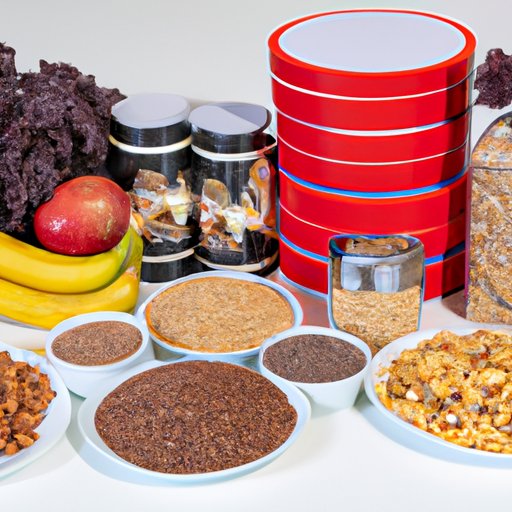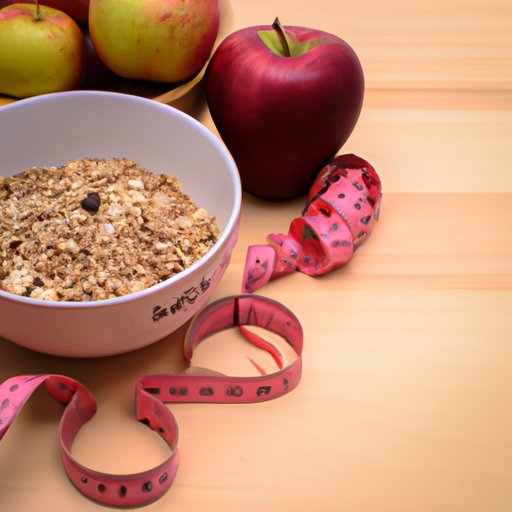Introduction
Dietary fiber is a type of carbohydrate found in plant-based foods such as fruits, vegetables, legumes, and grains. It is an essential part of a healthy diet and has numerous health benefits. In this article, we will explore the various benefits of dietary fiber, the different types of dietary fibers, and tips for increasing your dietary fiber intake for optimal health.
Exploring Dietary Fiber: What is it and What are its Benefits?
Dietary fiber is a type of carbohydrate that cannot be digested by the human body. It passes through the digestive system intact, providing numerous health benefits. While most carbohydrates are broken down into simple sugars during digestion, dietary fiber remains intact and is not absorbed into the bloodstream.
How does dietary fiber help the body? Here are three key ways that dietary fiber can benefit your health:
Weight Management
Dietary fiber helps to keep you feeling fuller for longer periods of time, which can aid in weight management. High-fiber foods take longer to digest, so they help to keep you feeling full and satiated for longer periods of time, which can help to prevent overeating.
Heart Health
Studies have shown that dietary fiber can reduce levels of LDL cholesterol (the “bad” cholesterol) and reduce the risk of cardiovascular disease. Dietary fiber binds to cholesterol in the digestive tract and carries it out of the body, reducing levels of LDL cholesterol in the blood.
Digestive Health
Dietary fiber helps to promote regular bowel movements and can prevent constipation. It also helps to feed the beneficial bacteria in the gut, which are important for good digestive health.
Understanding the Different Types of Dietary Fibers
There are two main types of dietary fibers: soluble and insoluble. Soluble fibers dissolve in water and form a gel-like substance in the digestive tract. Soluble fibers help to slow the absorption of sugar in the bloodstream, which can help to regulate blood sugar levels. Insoluble fibers do not dissolve in water and remain intact as they pass through the digestive tract. Insoluble fibers help to add bulk to stool, which can help to promote regular bowel movements.
There are many sources of dietary fiber, including fruits, vegetables, legumes, nuts, seeds, and whole grains. Whole grain products such as oatmeal, brown rice, quinoa, and barley are excellent sources of dietary fiber.
The Role of Dietary Fiber in Weight Management
Dietary fiber can play an important role in weight management. High-fiber foods tend to be more filling than low-fiber foods, so they can help to reduce cravings and keep you feeling fuller for longer periods of time. This can help to reduce overall calorie intake and aid in weight loss.
Here are some tips for increasing your dietary fiber intake for weight loss:
- Choose high-fiber, whole grain breads and pastas.
- Eat at least five servings of fruits and vegetables per day.
- Snack on nuts, seeds, and dried fruit instead of processed snacks.
- Add beans and lentils to salads and soups.
- Choose whole grain cereals and oatmeal for breakfast.

Dietary Fiber and Heart Health
Dietary fiber can help to reduce levels of LDL cholesterol in the bloodstream, which can reduce the risk of cardiovascular disease. Eating a diet high in dietary fiber can help to lower levels of LDL cholesterol and raise levels of HDL cholesterol (the “good” cholesterol), which can improve overall heart health.
Here are some tips for increasing your dietary fiber intake for cardiovascular health:
- Choose high-fiber, whole grain breads and pastas.
- Eat at least five servings of fruits and vegetables per day.
- Snack on nuts, seeds, and dried fruit instead of processed snacks.
- Add beans and lentils to salads and soups.
- Choose whole grain cereals and oatmeal for breakfast.

The Impact of Dietary Fiber on Digestive Health
Dietary fiber helps to promote regular bowel movements and can help to prevent constipation. It also helps to feed the beneficial bacteria in the gut, which are important for good digestive health. Eating a diet high in dietary fiber can help to keep your digestive system running smoothly.
Here are some tips for increasing your dietary fiber intake for digestive health:
- Choose high-fiber, whole grain breads and pastas.
- Eat at least five servings of fruits and vegetables per day.
- Snack on nuts, seeds, and dried fruit instead of processed snacks.
- Add beans and lentils to salads and soups.
- Choose whole grain cereals and oatmeal for breakfast.

Maximizing Your Intake of Dietary Fiber for Optimal Health
Eating a diet high in dietary fiber is essential for optimal health. Here are some healthy eating habits to maximize your dietary fiber intake:
- Choose high-fiber, whole grain breads and pastas.
- Eat at least five servings of fruits and vegetables per day.
- Snack on nuts, seeds, and dried fruit instead of processed snacks.
- Add beans and lentils to salads and soups.
- Choose whole grain cereals and oatmeal for breakfast.
If you find that you are not getting enough dietary fiber from your diet, there are supplements available that can help to increase your intake. Psyllium husk, flaxseed, and chia seeds are all excellent sources of dietary fiber.
Conclusion
Dietary fiber is an important part of a healthy diet. It can help to promote weight management, heart health, and digestive health. By eating a diet high in dietary fiber and incorporating healthy eating habits, you can maximize your dietary fiber intake for optimal health.
To summarize, dietary fiber is a type of carbohydrate that provides numerous health benefits. It can help to promote weight management, heart health, and digestive health. Eating a diet high in dietary fiber and incorporating healthy eating habits can help to maximize your dietary fiber intake for optimal health.
(Note: Is this article not meeting your expectations? Do you have knowledge or insights to share? Unlock new opportunities and expand your reach by joining our authors team. Click Registration to join us and share your expertise with our readers.)
